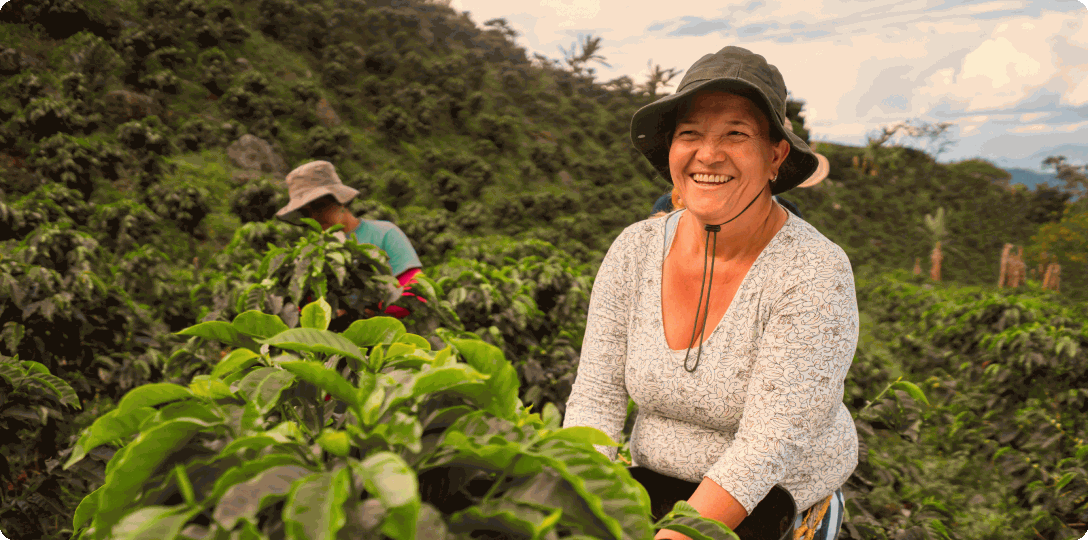Sustainable sourcing
NDPE and V-DCF
Time-saving responsible sourcing and investment decision-making support.

The challenge
Greenwashing is on the rise, leading to millions in fines and reputational damage. Consumers, buyers and investors want products to be the solution to environmental and social problems. Not the problem. They demand transparency. To win their trust, the industry cannot afford to grade their own homework anymore.
Independent, unbiased and science-based measurement in close cooperation with all value chain stakeholders involved is the new norm. Unfortunately, the journey is complex and overwhelming.
The solution
Say goodbye to costly self-reporting. Join us!
Standard setting initiatives such as No Deforestation, No Peat and No Exploitation (NDPE), its associated Implementation Reporting Framework (IRF), and the Verified Deforestation and Conversion Free (V-DCF) approach are widely endorsed across industries.
Together we will master the industry-leading independent environmental and social risk monitoring, supplier screening and progress reporting results required. Benefit from the tools leaders use to achieve the goals of the Agriculture Sector Roadmap to 1.5°C.
We help you understand your general risk, then help start thinking about supplier risk, and then about specific complaints (grievance) resolution.

Step 1
Start with a free readiness review:
how prepared are you?
One of our experts will talk to your team to assess the main gaps and opportunities. The review will define a feasible scope of work.
We help you provide a compliance statement for every shipment.
Step 2
Ramp up traceability:
mapping all plots of origin
Know where you are sourcing from. Collect geolocation coordinates of farm, plantation and concession boundaries, and/or key jurisdictions, i.e. administrative areas from the country down to the district level.
Have no data? We do! Whether originating from our best partners or newly mapped plots with advanced satellite tech.
Step 3
Screen your origins and suppliers
Clients ask us to first map high to low- risk areas for multiple commodities worldwide.
This helps them to better understand risk distribution and prioritise investment and engagement: which areas are most in need of near-real time monitoring first? Which areas can be verified with a jurisdictional approach?
Being able to track progress of origins and suppliers over time helps to understand and communicate positive impact.
We help to assess which suppliers and buyers are ‘Deforestation-Free’, with ‘Verified Deforestation and Conversion Free’ statistics and statements for each company in the supply chain. This overview allows you to select suppliers who:
✓ Implement traceability systems to identify the origin of production
✓ Meet legal requirements with regard to land use
✓ Are committed to NDPE policy implementation at the group level
✓ Are deforestation, peatland conversion and exploitation free
Our tools for jurisdictional approach include FLRI and IRF, enabling verification and communication of progress at the cooperative, mill, local jurisdictional to national and global level.
Step 4
Conduct risk assessment
Zooming into each individual farm, plantation and concession our platform automatically scans for non-compliance.
• Native Vegetation (e.g. woodland) conversion
• Fire
• Peatland and other Wetland conversion
• Clearing of high biodiversity and conservation value lands (HCV) including deforestation in nearby Parks and Reserves
• Clearing of high carbon lands (HCS)
• Water Depletion and Pollution
• Human Rights Violations (land grabbing, child labor, slavery, labor issues following No Exploitation policies) and Corruption
• Legal issues such as the IBAMA embargo list in Brazil and US Withhold Release Orders
Non-compliances are checked by our experienced analysts on a sampling basis using reference satellite and field data. And feedback from local practitioners. To ensure high quality and reliability.
Satelligence ensures smallholder inclusion. We unlock large- scale affordable monitoring for smallholders in partnership with Solidaridad, Fairtrade International amidst other leaders.
Step 5
Perform risk mitigation
Grievance tracking made simple. Detect and take action on risk before campaigners do.
Allowing you to detect and prevent potentially damaging events at an early stage.
Reactively: forest campaigns are damaging to corporate reputations and often lead to costly suspensions of supplier contracts. When campaigning NGOs uncover non-compliances they can become official complaints that companies must address using a complaint procedure. This is also called a ‘grievance’ mechanism.
Having a grievance procedure in place with public disclosure is becoming the norm.
Leverage our online Grievance Tracker so you don’t have to do all the time-consuming information collection, updating and engagement work. Curating grievances and checking their validity, we help avoid following up to an overload of ineligible bogus alerts. Saving time and money.
Based on our exceptional Global Database of Geolocated Assets and Supplier-Buyer relations we enable:
✓ Easy investigation and uncovering of corporate activities at the supplier parent group level including subsidiaries. Addressing grievances filed at the parent company level.
✓ Analysis of supply chain information for entire industries. Not just your company. We monitor your peers and any of your suppliers, all in one place.
✓ We assess the eligibility of grievances, both reactive grievances published by campaigning NGOs and proactive grievances spotted by Satelligence but not yet listed by campaigning NGOs:
• Documented evidence of compliance and non-compliance
• Investigations into non-compliant operations
• Determination of when and where environmental and human rights problems occur, and who is responsible.
This allows you to identify supplier associations with larger groups of corporate growers and processors and take action: helping suppliers to improve their practices, suspending suppliers, etc.